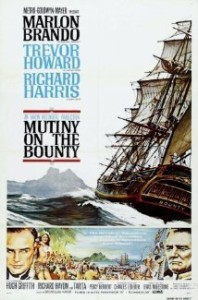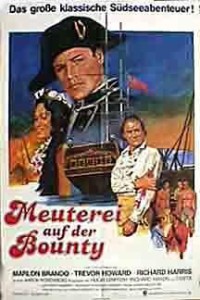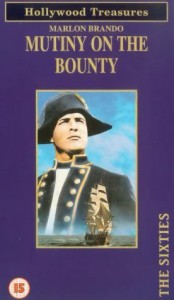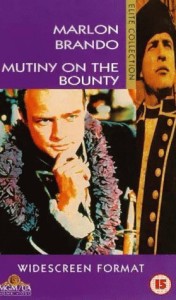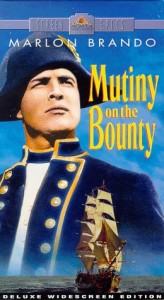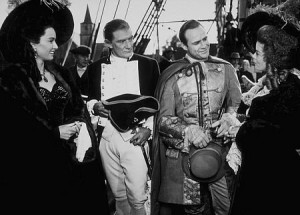Mutiny on the Bounty ** (1962, Marlon Brando, Trevor Howard, Richard Harris) – Classic Movie Review 2351
The 1962 remake of MGM’s 1935 classic film Mutiny on the Bounty is a lumbering adventure epic version of the famous story. It was nominated for seven Oscars but there were no wins.
Director Lewis Milestone’s 1962 remake of MGM’s 1935 classic film Mutiny on the Bountyis a lumbering adventure epic version of the famous story. It was nominated for seven Oscars but there were no wins at all. With a heavyweight cargo in a hold packed full with actory performances, scenes of lingering violence and long lazy stays in exotic Pacific paradises, it is over-blown and under-imaginative and not a patch on the earlier version.
At the cold heart of the movie, a miscast Marlon Brando entirely fails to convince as Fletcher Christian, playing him with unconvincingly foppish British tones. However, Trevor Howard tries hard to salvage the sinking project as the stern and unbending Captain William Bligh. And he does manage to keep it afloat, eradicating temporarily memories of Charles Laughton’s famous and much more extravagant performance in the role in 1935.
Once again The Bounty leaves Portsmouth in 1787 to sail to Tahiti and load bread fruit, and the ruthless Captain Bligh will do anything to get there as fast as possible. On the way back to England, First Lieutenant Fletcher Christian leads a mutiny of the crew.
Luckily, on the technical front all is entirely well. Production designers George W Davis and J McMillan Johnson’s settings are gorgeous, cinematographer Robert L Surtees’s widescreen camera work is excellent and Bronisław Kaper’s score is a memorable one. It was partly shot on location in the South Pacific.
But overall the movie is too slow and lacks enough excitement and dramatic tension to make it a true classic. Nevertheless, Milestone keeps the ship afloat, working under enormous difficulties of daily re-writes, re-filming and gaps between shooting.
Some scenes were directed by uncredited original director Carol Reed, who quarrelled with the producer Aaron Rosenberg, and other scenes were directed by star Brando.
It is based on the 1932 novel Mutiny on the Bounty by Charles Nordhoff and James Norman Hall, telling a fictionalised version of the real-life mutiny led by Fletcher Christian against William Bligh, captain of HMAV Bounty, in 1789. The many writers who worked on the script include credited Charles Lederer, original writer Eric Ambler, William L Driscoll, John Gay, Ben Hecht, Borden Chase, and Howard Clewes, but, despite all the effort, the screenplay does not emerge as a cohesive piece of distinguished work.
Eric Ambler was signed to write the script for $5,000 a week but MGM executives disliked his screenplay although he said he did 14 drafts. John Gay was signed to write a new version in July 1960. William L Driscoll, Borden Chase (writing in August 1960), Howard Clewes and Charles Lederer all wrote scripts. It is thought that Ambler did the first third of the film, about the journey, Driscoll did the second, about life on Tahiti, while Chase did the third, about the mutiny and afterwards. Gay wrote the narration. Then Lederer was brought on before filming was to begin.
It is the first film in the Ultra Panavision 70 widescreen.
It was a critical and box office failure. It cost $19 million, and took only $13.6 million at the box office, losing more than $6 million.
Marlon Brando signed on for $500,000 plus 10 per cent of the profits. It was to be filmed on location in Tahiti. Brando wrote in his memoirs that he was offered the lead in Lawrence of Arabia but chose Mutiny on the Bounty because he preferred to go to Tahiti, which had long fascinated him, rather than spend six months filming in the desert. He recalled: ‘David Lean was a very good director, but he took so long to make a movie that I would have dried up in the desert like a puddle of water.’ So Brando got no per cent of no profits, but there was good news for him. He picked a local Tahitian woman, Tarita Teriipaia, to play his love interest, and they married on August 10, 1962 (though they divorced in 1972) and they had two children.
Also in the cast are Richard Harris as Seaman John Mills, Hugh Griffith, Tarita, Richard Haydn, Gordon Jackson, Tim Seely, Percy Herbert, Duncan Lamont, Chips Rafferty, Noel Purcell, Ashley Cowan, Eddie Byrne, Torin Thatcher and Henry Daniell.
A working replica of the Bounty was built in Nova Scotia for $750,000 and sailed to Tahiti but it took nine months to make rather than the planned six and arrived after filming had started. More than 150 cast and crew arrived in Tahiti and MGM booked 200 hotel rooms. Shooting began on 28 November 1960. Filming was difficult with the script being continually rewritten and Brando reportedly ad-libbing.
In January 1961, after three months of filming, Reed flew back from location with an ‘undisclosed ailment’. The rainy season had started and the unit returned to Hollywood. MGM demanded Reed finish the film in 100 days but he said he needed 139. MGM fired him and replaced him with Lewis Milestone, in his last cinema film.
Filming resumed in March 1961 at MGM studios and in April 1961 the unit returned to Tahiti, where bad weather, script problems and actor trouble were a murky brew. Richard Harris clashed with Brando, and Brando was frequently late on set and difficult while filming.
Milestone recalled: ‘Marlon did not have approval of the story but he did have approval of himself. If Brando did not like something, he would just stand in front of the camera and not act. He thought only of himself.’ Milestone said the script was constantly being rewritten by Charles Lederer on set, with input from Rosenberg, Sol Siegel, Joseph Vogel and Brando. Milestone said Lederer would often work on the script with Brando in the morning so shooting would not start till afternoon. Milestone said: ‘You had the option of shooting it, but since Marlon Brando was going to supervise it anyway, I waited until someone yelled ‘camera’ and went off to sit down somewhere and read the paper.’
Shooting finished by October 1961 but in May 1962 work was still carrying on. MGM disliked the ending and Billy Wilder suggested a new one that was shot. But Milestone refused to direct it and George Seaton shot Christian’s death scene in August 1962. The film cost $10 million more than planned.
The Oscar nominations: Best Picture (Aaron Rosenberg), Best Art Direction – Color Art Direction (George W. Davis and J. McMillan Johnson); Set Decoration (Henry Grace and Hugh Hunt), Best Cinematography – Color (Robert Surtees), Best Film Editing (John McSweeney Jr), Best Music Score – Substantially Original (Bronisław Kaper). Best Song ‘Love Song from Mutiny on the Bounty (Follow Me); Music by Bronisław Kaper; Lyrics by Paul Francis Webster, and Best Special Effects (Visual Effects by A Arnold Gillespie; Audible Effects by Milo B Lory).
The film was shown on TV in the US on ABC on 24 September 1967 with a restored prologue and epilogue, cut from release prints of the film before its roadshow premiere, included as bonus features on the DVD release in 2006.
The American immigration authorities misspelt Polish film composer Bronisław Kaper’s name as Bronislau Kaper, and that is how is is credited in films, along with his actual name, or as Bronislaw Kapper, Benjamin Kapper, or Edward Kane. He scored the MGM musical film Lili (1953) and received the Academy Award for Best Original Score.
The cast are Marlon Brando as 1st Lt. Fletcher Christian, Trevor Howard as Captain William Bligh, Richard Harris as Seaman John Mills, Hugh Griffith as Seaman Alexander Smith, Richard Haydn as Horticulturalist William Brown, Tarita Teriipaia as Princess Maimiti, Matahiarii Tama as Chief Hitihiti, Percy Herbert as Seaman Matthew Quintal, Duncan Lamont as John Williams, Gordon Jackson as Seaman Edward Birkett, Chips Rafferty as Seaman Michael Byrne, Noel Purcell as Helmsman William McCoy, Ashley Cowan as Samuel Mack, Eddie Byrne as Sailing Master John Fryer, Tim Seely as Midshipman ‘Ned’ Young, Frank Silvera as Minarii, Henry Daniell as British chief court-martial admiral, Torin Thatcher as British officer Staines.
© Derek Winnert 2015 Classic Movie Review 2351
Check out more reviews on http://derekwinnert.com

